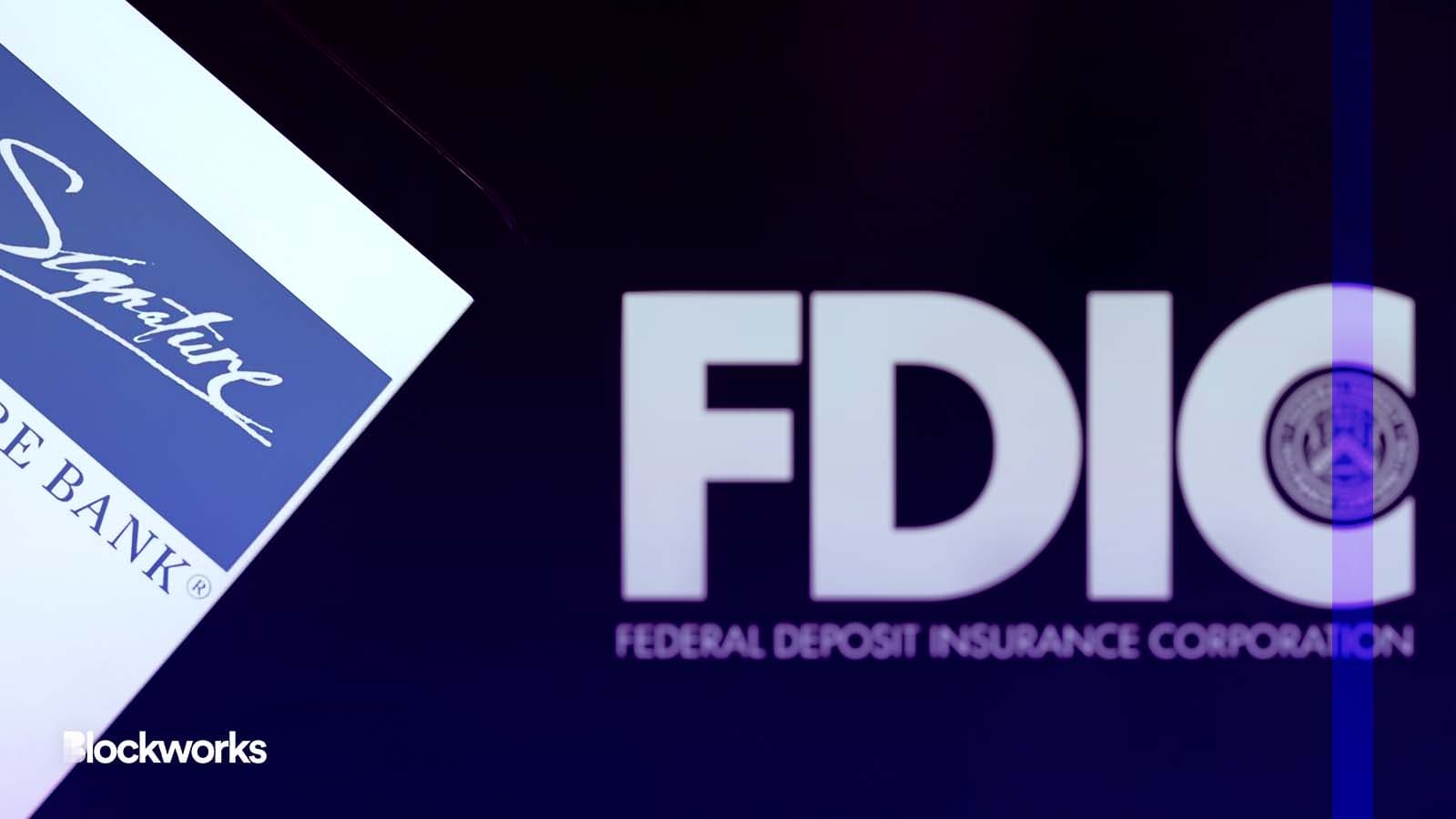FDIC Seeks To Sell Signature Bank — Crypto Business and All
Potential acquirers of Signature will tell the FDIC what assets and liabilities they’re willing to take from the bank, the FDIC representative added

Poetra.RH/Shutterstock.com modified by Blockworks
The Federal Deposit Insurance Corporation (FDIC) said it seeks to sell Signature Bank’s entire business, contradicting a report that buyers would have to agree to give up the company’s crypto dealings.
The report came Thursday from Reuters, which cited people familiar with the matter. Bids for Signature, as well as Silicon Valley Bank (SVB), are said to be due Friday.
But the FDIC would not require the divestment of crypto activities as part of any sale of the banks, a spokesperson told Blockworks.
The FDIC’s stance is consistent with previous guidance from the corporation — along with the Federal Reserve’s board of governors and the Office of the Comptroller of the Currency (OCC) — about the risks of cryptoassets.
“Banking organizations are neither prohibited nor discouraged from providing banking services to customers of any specific class or type, as permitted by law or regulation,” the regulators said in a January joint statement.
Potential acquirers of Signature will tell the FDIC what assets and liabilities they’re willing to take from the bank, the FDIC representative added.
“So clearly, those who are interested in the bidding process will create their own conditions for purchase,” the spokesperson said.
Samuel Dibble, a partner at law firm Baker Botts, said some buyers might want to include a clause that excludes buying the crypto business for a couple reasons.
“They [may] have made a conscious decision not to acquire or hold any digital assets, or they don’t know how to value digital assets and therefore want to submit a bid that avoids having to value them,” he said.
Interest to buy?
An executive at a mergers and acquisitions (M&A) advisory firm, who agreed to speak under the condition of anonymity, said Signature’s crypto-related business, including its digital payments platform, Signet, is crucially important to the sector and will be “very valuable” to the right acquirer.
“I suspect that the crypto portion of the business will find a buyer,” they said. “We see this as a crucial test for the industry.”
Though Silvergate shut down its exchange network, SEN, earlier this month, Signet remains operational. Signet, powered by technology from Tassat Group, allows commercial clients of the bank to transfer funds between one another in real-time.
“Signet … has operated smoothly and without interruption during this period to help facilitate needed intra-bank payments for Signature’s clients,” Tassat CEO Kevin Greene said in a statement. “The current events extend beyond Signature, and affect every bank in the country.”
But Donald Putnam, a managing director with M&A specialist Grail Partners, said he expects banks that have acted as rails for fintech payment systems, such as Signature and SVB, will find few ready buyers.
“Those businesses are under regulatory scrutiny and low margin,” he added. “A few banks — Cross River comes to mind — have made a big profitable business supporting fintech, but they are the exception. The larger banks are still experiencing losses on every transaction when all costs are accounted for.”
Dibble said the benefit of buying Signature’s assets would be to acquire its relationships that it has with depositors and borrowers. But he noted, the market is a bit “spooked” right now.
“I don’t really see the ‘too big to fail’ banks rushing into a crypto business at this stage and I also don’t see any other mid-size or regional banks…looking to double down by acquiring all of Signature’s assets — or even just its crypto assets,” he said.
Advocacy groups speaking up
The crypto banking landscape is clearly in flux after the collapse of Silvergate, Signature and Silicon Valley Bank.
The original report which stated whoever acquires Signature would have to give up the company’s crypto dealings sparked the ire of certain advocacy groups in the sector.
“As long as a crypto company can demonstrate its ability to be a good bank customer, it should be able to be banked and not be subject to a black-and-white blanket ban,” Sheila Warren, CEO of the Crypto Council for Innovation, said in a statement.
The Blockchain Association said Thursday it sent Freedom of Information Act (FOIA) requests to the FDIC, OCC and the Federal Reserve’s board of governors to investigate the potential de-banking of lawful crypto business, in what some have theorized could be part of a second “Operation Choke Point.”
The advocacy group added that allegations include account closures and the refusal to open new accounts, which it said is “more concerning in the wake of this week’s banking crisis.”
A Blockchain Association spokesperson did not comment on which banks are allegedly de-banking crypto firms. The group has established a tip line seeking to collect more information.
Jake Chervinsky, the Blockchain Association’s chief policy officer, argued via Twitter that there is no valid reason to de-bank crypto companies.
“They’re just like all other law-abiding companies that need bank accounts to operate: they hold dollars to pay rent, salaries and taxes,” he wrote. “If regulators are debanking crypto companies, they’re breaking the law.”
Updated March 16, 2023 at 3:42 pm ET: Added comments from Samuel Dibble, a partner at law firm Baker Botts.
Get the news in your inbox. Explore Blockworks newsletters:
- The Breakdown: Decoding crypto and the markets. Daily.
- 0xResearch: Alpha in your inbox. Think like an analyst.






